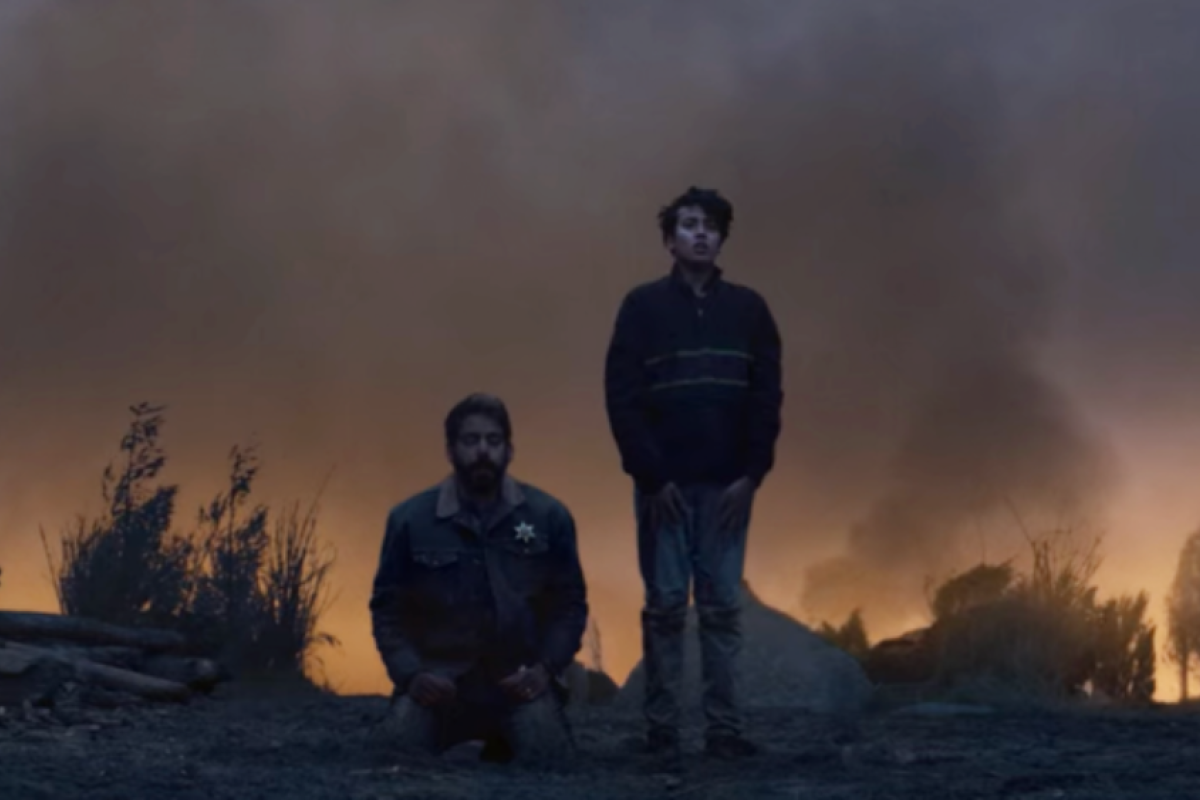
Midnight Mass and the Spectre of Terror
A generation has grown up under the shadow of post-9/11 preoccupation with Islam and Muslims: Midnight Mass presents something far more interesting
Please be advised: this essay contains spoilers for Mike Flanagan’s 2021 Netflix miniseries, Midnight Mass.
A generation of Muslims has grown up under the shadow of society’s post-9/11 preoccupation with Islam and Muslims, and popular culture is no exception. Hollywood movies and series commonly represent Muslims as foreign terrorists, patriotic agents of the security state, or victims of an oppressive culture. Over the years, the persistence of these images has stirred in some Muslims a desire for more positive representation, but it also increasingly points to the limits of an empowerment project dependent on representation.
Hollywood’s war propaganda about Islam and Muslims is difficult to ignore. Films with Muslim characters such as The Kingdom (2007), The Hurt Locker (2008), Zero Dark Thirty (2012), Argo (2012), American Sniper (2014), London Has Fallen (2016), and shows like NCIS, 24, Homeland, and The Bodyguard tell their stories through themes of danger, violence, and misogyny. Muslims only seem to be intelligible and visible on our screens within these thematic confines. A 2021 study by the USC Annenberg Inclusion Initiative, “Missing and Maligned: The Reality of Muslims in Popular Global Movies,” studied 200 films from the UK, US, and Australia that included Muslim characters and found that 39% of these characters were the perpetrators of violence and 58% were the targets of violence.
Nor do we see much of an improvement with the rise of Muslim sitcoms like United States of Al which boasts about having a first Muslim protagonist – an Afghan interpreter for the American military. The condition for recognition and shared humanity in this sitcom is to subscribe to ideas of American heroism, innocence, and hospitality. Violence and danger are what Sara Ahmed (2004) calls “sticky associations,” and filmic depictions of Muslims don’t stray far from them.
Even when movies and TV series try to offer more subtle representations of Muslim life, they rarely depart from the geopolitical calculus of “the good Muslim” vs the “bad Muslim.” In the best of these representations such as Hala, Elites, Ramy, and We Are Lady Parts, Muslim characters are understood less in terms of their faith than as norm-defying modern liberals. It is as though a more subtle or residual form of Islamophobia acts through these depictions to unravel Islam as a social and political force, reducing it to just another form of individual expression.
The sinister plotting Muslim, the “modern” Muslim whose fidelity is to her wine glass above all, and the Muslim “cool” girl whose personality revolves around what she does with her headscarf, are now tropes, signalling that Muslim storylines have become trite.
Against this backdrop of disappointing depictions, Mike Flanagan’s Midnight Mass (Netflix, 2021) comes as a breath of fresh air. Prior to this miniseries, Flanagan already had an impressive record of exploring heavy themes like grief and trauma through horror, making the best of a genre which has always pushed boundaries and yet is rarely engaged directly with the exhausted political themes of Muslim-centered television.
Midnight Mass is a meditation on horror and religion. A small island fishing community witnesses mysterious events that are eagerly embraced as miracles. A young girl miraculously walks again, aging is reversed, redemption is promised. As congregants attribute these miracles to the arrival of a charismatic young priest, the dwindling Catholic church is resuscitated with newly devoted, hopeful believers.
Yet this is supernatural horror, and all is not well. The priest, Father Paul Hill (Hamish Linklater) has mistaken a vampire for an angel who fed off him and rejuvenated his frail aging body. Now a vampire himself, the priest relies on the “angel’s” blood to stay alive, while using it to perform miracles by infecting the community through communion. A cleansing ritual through the symbolic consumption of the blood of Christ becomes doubly symbolic, as it is now poisoned with vampiric blood. All this is justified for the congregants with religious prophecies, divine warnings, and punishment.
It is no coincidence that Flanagan chose a vampire for his preferred monster, or that the vampire is misrecognized as an angel. Vampires straddle the boundaries between human and other, undetected, a contagion, seductive, draining us of our blood until we are either dead or turned. In Frantz Fanon’s Wretched of the Earth (1963), a psychopathology of the colonial condition, the vampire stalks and possesses, feeding off the blood of the colonized, turning them into the living dead. Vampirism signals a non-existence that spreads with every drop of spilled blood. One cannot help but think of the vampire as America’s religious origin story: the Church spreading the gospel of colonial expansion, land theft, and mass murder, under the spiritual direction of an angel of manifest destiny.
As death descends on the island in the masquerade of divine salvation, religion manifests itself as a perversion, the promise of rebirth as neither living nor dead. The promise of rebirth plunges us into a purgatory that blinds, seducing us by a ruse of divine justice, where monstrous blood paves the way for monstrous behaviour. The most unsettling embodiment of this perversion is not the vampiric “angel” who is a backdrop to human affairs. It is the figure of Bev Keane (Samantha Sloyan), the island’s zealous and mean-spirited church administrator. In Bev we have the true monster whose desire for domination, exclusion, and punishment ever grows, feeding off others’ desperation, loss, isolation, and trauma. So drunk is Bev on her righteousness that she oversees the total destruction of her community, first by offering up the islanders’ property to developers, and later by surrendering her neighbours to an entity that she believes has come to save the righteous (which only she is able to determine). It is the melancholic tragedy running through this series that stays with you.
The careful rendering of religious themes in Midnight Mass is refreshing enough. But Flanagan’s real surprise is to offer us one of the most compelling depictions of Muslim life on screen. Through the character of Hasan the Muslim sheriff (Rahul Kohli) and his son Ali (Rahul Abburi), we see Islam as a faith that goes beyond the performative examples of “positive” Muslim representation. In the series, faith depends on seen and unseen truths rooted in both the social and the transcendental. Yet some in the island community treat the Muslim characters’ intimate faith as suspicious. This distrust becomes the colonizing element in Hasan’s story, forcing him to play a reluctant role in the collective paranoia of others.
Hasan has to contend with the recruitment of his son into the church, which epitomizes the struggle of many immigrant parents to hold on to their faith so that generational divides do not lead to cultural death. Ali’s restless conversations with his father about his dead mother, faith, and his curiosity about the church, mark a time of inner turbulence in any young person’s life. Even when the trope of the drinking Muslim is put to use, it is subtle. Here, drinking is not a way to “humanize” the Muslim or extol the virtues of liberal desire, but becomes another herald of the sinister plot swirling around him. What we witness in Ali is an impressionable teenager genuinely searching for truth only to become entangled in a rendition of a post-9/11 American “You are with us or with the terrorist” plot emanating from the church.
As the threat mounts, and Hasan is called in for help, we hear more about Hasan and Ali’s background: How they found themselves on the island and how Hasan’s experience makes him reluctant to enter the church and investigate the unfolding vampiric plot. Hasan’s monologue is a testimony to the Muslim experience after 9/11. While not a Muslim himself, Rahul Kohli recognized the weight of this scene as a historical witnessing of the surveillance, suspicion, and racial harassment that Muslims experienced after 9/11, including what he and his Muslim friends went through as brown youths growing up in the United Kingdom.
Hasan explains how joining the police force was his way of helping to fight the threat of terrorism. Appealing to white anxiety in conventional Hollywood style, his admission shows how victims of racism find ways to survive their conditions of oppression. Putting aside histories of imperial wars, Hasan identifies with an injured innocent America to quell racist paranoia. Yet what his experience ultimately reveals is that the strategy of combatting Islamophobia can provoke a different kind of racism, one that has a phobic preoccupation with the Muslim as an enemy within. Hasan’s sobering monologue captures the paranoia:
“But then it started to occur to them that, with so many of us on the [police] force, elevated to positions of real authority, what if that had been our plan all along? What if we were interlopers? What if we were infiltrators? What if we were double agents?”
Such “what ifs” continue to haunt the lives of Muslims today. There is simply no escaping the provocations.
There is room for misgivings about some of Mike Flanagan’s narrative choices. Why, for example, would Hasan choose to flee Islamophobia to settle in a small island community of white Catholics? Why not a Muslim community? Was he escaping one kind of surveillance for another? And why did Flanagan create a Muslim sheriff at a time when policing is under scrutiny with the Black Lives Matter movement and abolition is on the agenda? Is this an indictment of the police for its exclusionary practices, or does it give legitimacy to Hasan’s testimony? The miniseries seems to suggest that white America’s self-reflexivity, which Hasan’s words are inviting, can only be made possible through the sanctimony of his institutional role.
In its white American Catholic setting, Midnight Mass flips the script by authorizing a Muslim with policing powers to respond to a dangerous fundamentalism. Horror is at its most chilling here in presenting white America’s own “abject,” its own fundamentalism cast off, and assigning its imagined enemy – an infiltrated Muslim police officer – the task to combat it. This is Islamophobia’s own terror unfolding.
It is likely that many people will view this series as one that warns of the fanaticism inherent to religion, against which secular prophets have long sounded the alarm. But Midnight Mass presents something far more interesting. The social rot in the island community had sunk in even before the revitalization of the church made it a prey for fundamentalists. One cannot watch the show without reflecting on our current times, the contagion of Trumpism, the resurgence of ethnonationalism, and proliferating conspiracies. We are being warned of the threats of human depravity, the breakdown of community, a looming insularity, and how these dangers can stir the monster within us, a monster that can don the mask of piety.
This is a story about the limits of human knowing and the certainty of living and dying with one’s neighbour. When our world is in flames, Flanagan reminds us, we all end up in the same place, facing our mortality. The state in which we find ourselves in the final moment of death reveals to us whether we ever believed at all.
As the sun rises and threatens to destroy the community of vampires, Bev frantically digs into the sand, a false prophetess desperately struggling to delay death. Meanwhile, a critically injured Hasan and an infected Ali recite the Muslim declaration of witness that there is no god but God, reunited in their last sajda (prostration) to God on the shore. Flanagan has made the profound choice to present Bev’s supposed “terrorists” as the ones most dignified all along.


